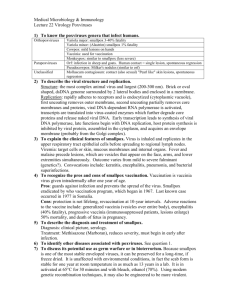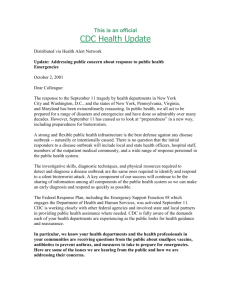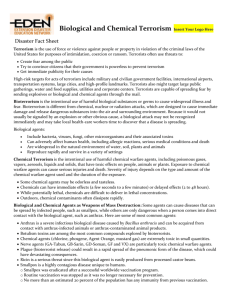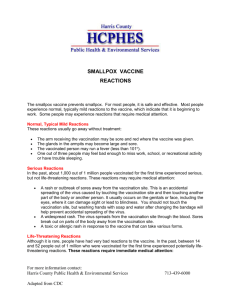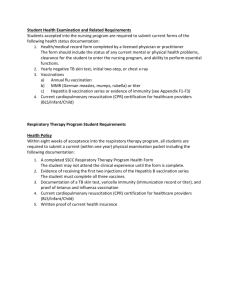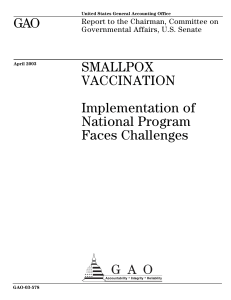Letter to Senator Evan Bayh regarding the Smallpox
advertisement
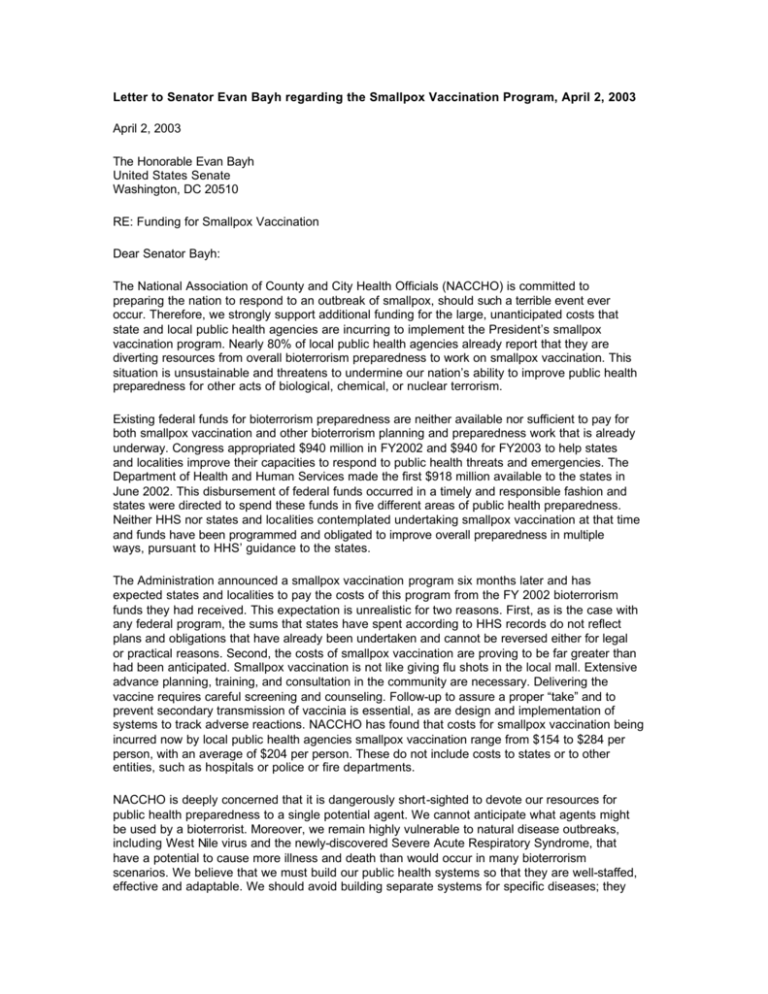
Letter to Senator Evan Bayh regarding the Smallpox Vaccination Program, April 2, 2003 April 2, 2003 The Honorable Evan Bayh United States Senate Washington, DC 20510 RE: Funding for Smallpox Vaccination Dear Senator Bayh: The National Association of County and City Health Officials (NACCHO) is committed to preparing the nation to respond to an outbreak of smallpox, should such a terrible event ever occur. Therefore, we strongly support additional funding for the large, unanticipated costs that state and local public health agencies are incurring to implement the President’s smallpox vaccination program. Nearly 80% of local public health agencies already report that they are diverting resources from overall bioterrorism preparedness to work on smallpox vaccination. This situation is unsustainable and threatens to undermine our nation’s ability to improve public health preparedness for other acts of biological, chemical, or nuclear terrorism. Existing federal funds for bioterrorism preparedness are neither available nor sufficient to pay for both smallpox vaccination and other bioterrorism planning and preparedness work that is already underway. Congress appropriated $940 million in FY2002 and $940 for FY2003 to help states and localities improve their capacities to respond to public health threats and emergencies. The Department of Health and Human Services made the first $918 million available to the states in June 2002. This disbursement of federal funds occurred in a timely and responsible fashion and states were directed to spend these funds in five different areas of public health preparedness. Neither HHS nor states and localities contemplated undertaking smallpox vaccination at that time and funds have been programmed and obligated to improve overall preparedness in multiple ways, pursuant to HHS’ guidance to the states. The Administration announced a smallpox vaccination program six months later and has expected states and localities to pay the costs of this program from the FY 2002 bioterrorism funds they had received. This expectation is unrealistic for two reasons. First, as is the case with any federal program, the sums that states have spent according to HHS records do not reflect plans and obligations that have already been undertaken and cannot be reversed either for legal or practical reasons. Second, the costs of smallpox vaccination are proving to be far greater than had been anticipated. Smallpox vaccination is not like giving flu shots in the local mall. Extensive advance planning, training, and consultation in the community are necessary. Delivering the vaccine requires careful screening and counseling. Follow-up to assure a proper “take” and to prevent secondary transmission of vaccinia is essential, as are design and implementation of systems to track adverse reactions. NACCHO has found that costs for smallpox vaccination being incurred now by local public health agencies smallpox vaccination range from $154 to $284 per person, with an average of $204 per person. These do not include costs to states or to other entities, such as hospitals or police or fire departments. NACCHO is deeply concerned that it is dangerously short-sighted to devote our resources for public health preparedness to a single potential agent. We cannot anticipate what agents might be used by a bioterrorist. Moreover, we remain highly vulnerable to natural disease outbreaks, including West Nile virus and the newly-discovered Severe Acute Respiratory Syndrome, that have a potential to cause more illness and death than would occur in many bioterrorism scenarios. We believe that we must build our public health systems so that they are well-staffed, effective and adaptable. We should avoid building separate systems for specific diseases; they will tax our resources, and unless we use them day in and day out, they won't work well when they are really needed. We must also achieve preparedness specifically for smallpox, which has the unique feature of requiring vaccination of a number of public health and medical personnel, but we cannot afford to sacrifice other improvements in that process. We appreciate your leadership and concern for public health protection and look forward to working with you to ensure that the public health system is able to improve preparedness for all public health threats and emergencies, in addition to smallpox. Sincerely, Patrick M. Libbey Executive Director
